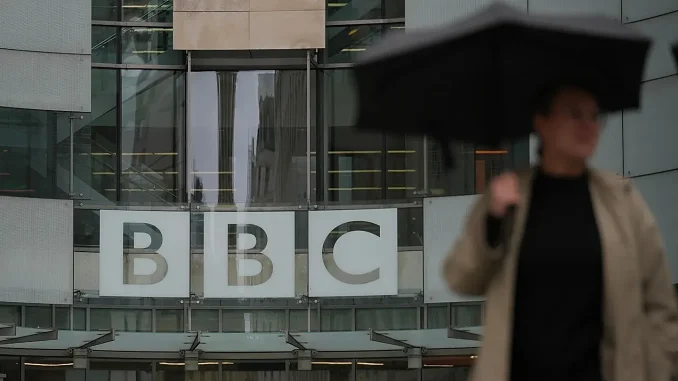
ER Editor: See these two articles we recently published on BBC transgressions over Trump —
BBC Doctored Trump Speech, Internal Report Reveals

Tim Davie and BBC News Chief Resign From Corporation
The news culture the anonymous BBC staff member describes below is that of an insular, self-reinforcing group of (upper-) middle class professionals that are completely cut off from the reality of ordinary people and ordinary life. They may have hated Thatcher, as did many, but that didn’t mean they were on the side of those working class people who suffered under Thatcher. This is the group duped by their own ‘good’ values, who probably took several Covid shots.
********
The BBC’s Delusional Belief in its Objectivity
ANONYMOUS FORMER BBC STAFF MEMBER for DAILY SCEPTIC

The latest debacle in the BBC’s troubled history has left me thinking a great deal. Throughout the 1980s and 90s I worked for BBC Radio News at, first, Bush House (World Service) and then at Broadcasting House on programmes such as The World At One, PM, The World Tonight and Newsbeat.
There was undoubtedly a sense of mission prevailing at both places, but that went hand in hand with a sense of importance and significance. There was a considerable amount of competitiveness amongst some of the reporters and a deliberate strategy to set the national news agenda. That’s completely normal for any news organisation, but the BBC’s remit and reach elevate the stakes. It’s easy to see how the desperation to break the big story on a national stage could lead almost any ambitious reporter, or a programme editor, into overstepping the mark in a way that looks like bias.
Bullying was certainly not uncommon, triggered in no small part the frantic competitive urgency of a live news organisation. There was a producer in one of the BBC’s overseas services whose behaviour today would have resulted in a peremptory sacking. His staff were cowed into terrified acquiescence, often while he ranted in screaming frenzies in studios in his desperation to have everything his way. He was later made an MBE by Blair’s government.
The Martin Bashir-Diana interview controversy epitomises the problem of the journalist in search of fame and prominence. But my recollections of those days are definitely not those of an institutionally-biased organisation. It was much more subtle than that. The whole tone of the BBC workplace was like a social club for a broad church of Left-leaning individuals.
It’s very hard to define this clearly, but the best example I can think of is that it was taken for granted back in those days Margaret Thatcher and the Conservative Party were villains of the worst order. While I never saw this translate into deliberate editorial distortion, it meant that many individuals involved in the editorial content of news started from a position in which they personally saw contemporary British Right-wing politics as abhorrent in some way. This was reflected in everyday conversation in studios and newsrooms. It was bound in some way, however indirect, to be reflected in the tone of coverage.
This culture meant that anyone who tried to interject with nuance or balance was looked on with suspicion and was regarded as being a polar opposite. The result was that any dissenters usually kept their mouths shut.
However, I have a vivid memory of one news producer ranting because he’d been called by Dr David Owen, then one of the leaders of the Social Democratic Party (SDP). He claimed that Owen was demanding a news story was altered in the SDP’s favour. It’s a reminder of the fact that the BBC is also bombarded night and day by people desperate to manipulate the news agenda.
The BBC’s 24-hour operation mean very antisocial shifts. This provokes a sense of otherworldliness, cut off in isolation from the rest of the world. Long evenings and nights were, and today are even more, common. This contributed, along with a deliberately ‘inclusive’ recruitment policy, of helping the BBC’s news operations function as safe havens for those belonging to an array of minority groups. Their presence, in far higher proportions than would normally be the case in the workplace, naturally encouraged, and I imagine still does, the Guardian-esque atmosphere reinforced by a groupthink sense of an alternate reality.
It would be a falsehood to suggest that this was all bad. The BBC was, and remains, a progressive employer. In my time, for example, there were numerous women in very senior managerial positions who did outstanding jobs. The system was exceptionally accommodating to staff with families. It was unlike anywhere else I had worked in before or since.
Nonetheless, Harriet Sergeant’s article in the Telegraph about how she was cancelled by the BBC for trying to tell the truth about immigration as far back as 2016 seemed to cut right to the core of the problem. She interviewed two homeless British teenagers who told her, almost incidentally, about how every time they reached a hostel, they discovered all the beds had gone to migrants:
When I looked into their claim, I found migrants made up around half of rough sleepers in London and one in three elsewhere. The rise in the homeless and their overwhelmed facilities was a direct result of the rise in immigration. It was also an example of how migration has hit the poorest in society hardest. This seemed a crucial point to make in a programme on homelessness.
The BBC producer who checked my script thought otherwise. I only wanted a sentence or two as background. But she warned that any criticism of immigration would harm my future relationship with the BBC. I was astonished. Not even when I researched my first book on apartheid in South Africa or my second, in China shortly after the Cultural Revolution, had anyone tried to censor me before. Yet here was the BBC, the BBC of all institutions, insisting I ignore a key fact.
Sergeant added that Andy Burnham, then an MP (ER: now the mayor of Manchester), was one of people the BBC’s researcher had identified who pinned the shortage of beds on Tory austerity and cuts, with no mention of migrants.
On the face of it, this looks like a deliberate BBC bias designed to suppress any negative news about migration. And perhaps it was. But I’d be inclined to attribute it equally to the BBC producer’s fear of being seen to divert from the mood and culture within the organisation.
The conclusion I’ve reached in recent days is that falsification of Trump’s speech had its remoter origins in, for example, the animus held towards Thatcher 40 years ago, but now exacerbated by a new level of arrogance, presumption and complacency of some editorial staff. They operate in an environment where they feel they can act as they please to reinforce a message that they are certain is merely reflecting what they imagine is an absolute truth.
This can be explained by a paradox. The hatred of Thatcher was regarded in my time at the BBC as ‘normal’, ‘correct’, even ‘morally right’, and thus was confused with the belief that it was an objective position to hold. Exactly the same mentality has now been applied to issues such as ‘climate change’, transgender issues and Reform.
No surprise then that Jonathan Monro, the new acting Head of News, is on record as regarding the editing of Trump’s speech as “normal practice“. If you are already convinced that Trump’s intentions are malevolent, and that everyone else thinks so, then perhaps it does seem only reasonable to edit a speech to reinforce that. Monro was, incidentally, the head of newsgathering at the BBC when a helicopter was sent to watch the police raid Cliff Richard’s home (ER: Celebrity UK singer Cliff Richard turned out to be a pedophile).
This blurring of polarised views with a delusion of righteous and reasonable objectivity is hardly unusual in wider society. Being genuinely objective is rarely intuitive for human beings. It’s why eyewitness evidence is so unreliable. Like the true mechanisms of scientific enquiry, objectivity requires constantly relearning. But believing in one’s reasonableness and that therefore any other reasonable person would be on the same page is common behaviour.
In an organisation like the BBC, which functions within fortress strongholds, it’s unsurprising that this blurring has taken hold in differing degrees. This amounts to it being all too common for BBC staff to be utterly convinced of their objectivity. Perhaps some would say that does equate to institutional bias. I would say the difference is that it is not generally deliberate, even if perhaps the effect is much the same.
However, amidst all the flak being hurled at the BBC, it’s worth pausing and remembering that Britain has changed a great deal since the 1980s. British society is more fractious, fractured, polarised, stressed and uncertain than it has been for generations. It is hardly surprising that the BBC in certain ways has succumbed to some of those changes, and perhaps even been actively targeted by members of certain groups who have sought and gained employment there with the purpose of promoting their causes or points of view.
The BBC today is not the BBC I worked for, but the seeds and weak beginnings of this latest decisive debacle were in evidence decades ago.
Source
Featured image source: https://www.euronews.com/2025/11/10/bbc-receives-letter-from-donald-trump-threatening-legal-action-over-edited-speech
************
Published to The Liberty Beacon from EuropeReloaded.com

![]()
••••
The Liberty Beacon Project is now expanding at a near exponential rate, and for this we are grateful and excited! But we must also be practical. For 7 years we have not asked for any donations, and have built this project with our own funds as we grew. We are now experiencing ever increasing growing pains due to the large number of websites and projects we represent. So we have just installed donation buttons on our websites and ask that you consider this when you visit them. Nothing is too small. We thank you for all your support and your considerations … (TLB)
••••
Comment Policy: As a privately owned web site, we reserve the right to remove comments that contain spam, advertising, vulgarity, threats of violence, racism, or personal/abusive attacks on other users. This also applies to trolling, the use of more than one alias, or just intentional mischief. Enforcement of this policy is at the discretion of this websites administrators. Repeat offenders may be blocked or permanently banned without prior warning.
••••
Disclaimer: TLB websites contain copyrighted material the use of which has not always been specifically authorized by the copyright owner. We are making such material available to our readers under the provisions of “fair use” in an effort to advance a better understanding of political, health, economic and social issues. The material on this site is distributed without profit to those who have expressed a prior interest in receiving it for research and educational purposes. If you wish to use copyrighted material for purposes other than “fair use” you must request permission from the copyright owner.
••••
Disclaimer: The information and opinions shared are for informational purposes only including, but not limited to, text, graphics, images and other material are not intended as medical advice or instruction. Nothing mentioned is intended to be a substitute for professional medical advice, diagnosis or treatment.

Leave a Reply